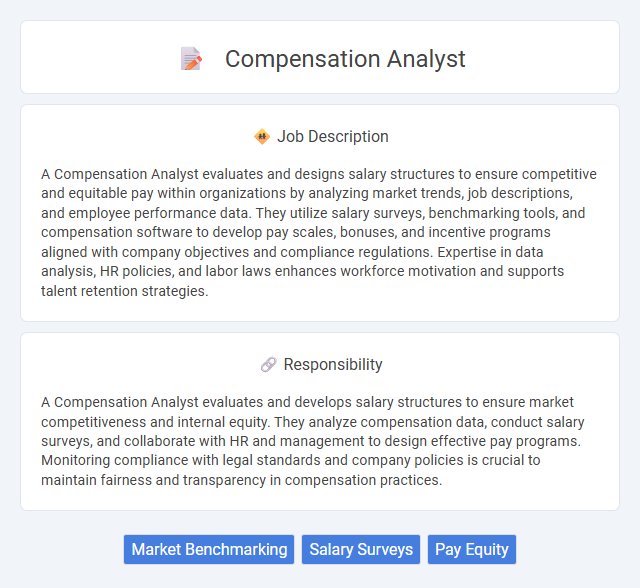
A Compensation Analyst evaluates and designs salary structures to ensure competitive and equitable pay within organizations by analyzing market trends, job descriptions, and employee performance data. They utilize salary surveys, benchmarking tools, and compensation software to develop pay scales, bonuses, and incentive programs aligned with company objectives and compliance regulations. Expertise in data analysis, HR policies, and labor laws enhances workforce motivation and supports talent retention strategies.
Individuals with strong analytical skills and a keen interest in data interpretation are likely suited for a Compensation Analyst role, as the job involves evaluating salaries and benefits to ensure fairness and competitiveness. Those who thrive in detail-oriented environments and possess excellent communication abilities may find this position aligns well with their strengths. Conversely, individuals preferring less quantitative tasks or minimal interaction with policy development might find the role less compatible with their skills and preferences.
Qualification
A Compensation Analyst typically requires a bachelor's degree in human resources, finance, business administration, or a related field, with professional certifications such as Certified Compensation Professional (CCP) enhancing job prospects. Strong analytical skills, proficiency in compensation software, and in-depth knowledge of compensation structures, labor laws, and market salary trends are essential qualifications. Experience with data analysis tools like Excel, SQL, or HRIS systems is often preferred to effectively evaluate and benchmark employee compensation packages.
Responsibility
A Compensation Analyst evaluates and develops salary structures to ensure market competitiveness and internal equity. They analyze compensation data, conduct salary surveys, and collaborate with HR and management to design effective pay programs. Monitoring compliance with legal standards and company policies is crucial to maintain fairness and transparency in compensation practices.
Benefit
A Compensation Analyst likely evaluates employee benefit programs to ensure competitive and equitable packages. They may analyze market trends and internal data to recommend enhancements that improve retention and satisfaction. Strong skills in data interpretation and communication probably support their role in aligning benefits with organizational goals.
Challenge
Compensation Analyst roles likely involve complex data analysis to maintain competitive and equitable pay structures, demanding strong problem-solving skills and attention to detail. Interpreting market trends and internal salary metrics may pose challenges in aligning compensation strategies with organizational goals. Adapting to constantly evolving regulations and business needs could require continuous learning and flexibility.
Career Advancement
Compensation Analysts play a crucial role in evaluating and implementing salary structures, ensuring competitive and equitable pay within organizations. Mastery of market data analysis and employee compensation trends can lead to opportunities as Senior Compensation Analysts, Compensation Managers, or Total Rewards Directors. Developing expertise in data analytics, HR technologies, and strategic compensation planning enhances prospects for leadership roles in human resources and organizational development.
Key Terms
Market Benchmarking
Compensation Analysts specialize in Market Benchmarking by analyzing salary data, industry trends, and competitor pay practices to ensure competitive and equitable compensation structures. They utilize tools such as pay surveys and data analytics platforms to create market-aligned salary ranges and total rewards strategies. Their insights support talent acquisition, retention, and budgeting decisions by aligning internal pay scales with external market standards.
Salary Surveys
Compensation Analysts specialize in conducting and analyzing salary surveys to ensure competitive and equitable pay structures within organizations. They gather market data from various industry sources to benchmark salaries, benefits, and incentive programs accurately. This role requires proficiency in data analysis and a deep understanding of compensation trends to support strategic HR decision-making.
Pay Equity
Compensation Analysts specializing in Pay Equity conduct detailed salary data analysis to identify and rectify wage disparities across gender, race, and other demographics, ensuring compliance with legal standards such as the Equal Pay Act and the Paycheck Fairness Act. They design and implement equitable compensation structures by benchmarking against industry standards and utilizing statistical tools like regression analysis to support fair pay practices. These professionals collaborate with HR and legal teams to develop pay equity reports and strategies that promote transparency and organizational inclusivity.
 kuljobs.com
kuljobs.com